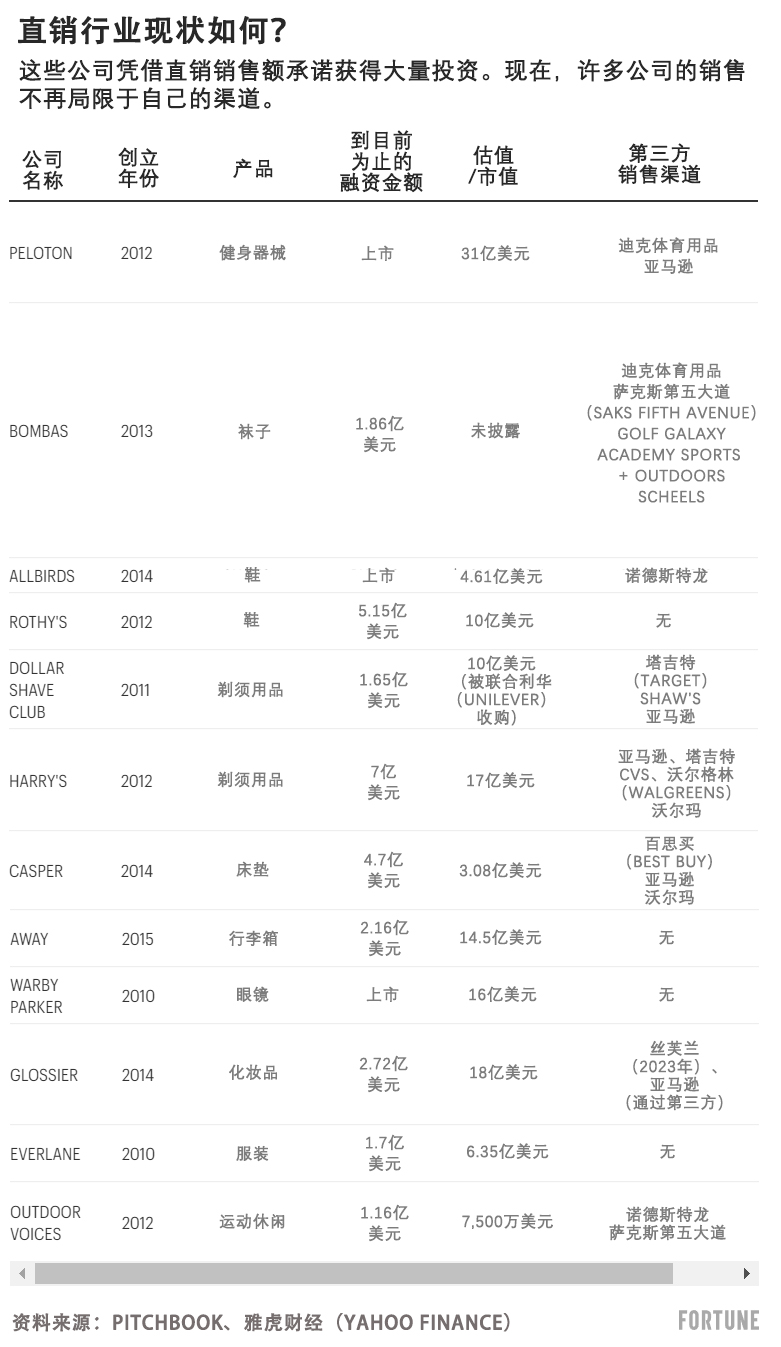
風(fēng)險(xiǎn)投資公司Forerunner投資了過(guò)去十年誕生的多個(gè)知名度最高的品牌,,包括行李箱制造商Away,、化妝品公司Glossier和高端狗糧供應(yīng)商Farmer’s Dog。所謂直銷(xiāo)(DTC)品牌通過(guò)有針對(duì)性的社交媒體策略,,可以繞過(guò)大型零售商,,直接對(duì)接買(mǎi)家,因此頗受追捧,。
但如果你問(wèn)Forerunner的合伙人妮可·約翰遜現(xiàn)在想投資哪類(lèi)公司,,直銷(xiāo)初創(chuàng)公司的排名絕對(duì)靠后。事實(shí)上,,她表示她不會(huì)投資采用純直銷(xiāo)策略的公司,。
約翰遜說(shuō):“直銷(xiāo)模式曾經(jīng)是創(chuàng)新和零售的前沿,或者本身很有趣,,但這已經(jīng)是整整十年前的事情了,。”她表示,,現(xiàn)在直銷(xiāo)渠道只是一個(gè)對(duì)年輕消費(fèi)者品牌有用的“籌碼”而已,,它本身不再是一種商業(yè)模式。
這種觀點(diǎn)得到了《財(cái)富》雜志采訪的多位風(fēng)險(xiǎn)投資者的認(rèn)同,,體現(xiàn)了改變了互聯(lián)網(wǎng)格局的重要變化,,以及在經(jīng)濟(jì)不確定時(shí)期私營(yíng)企業(yè)投資者心態(tài)的轉(zhuǎn)變。如果說(shuō)直銷(xiāo)初創(chuàng)公司曾經(jīng)被認(rèn)為是零售業(yè)革命的先驅(qū),,那么目前在風(fēng)險(xiǎn)投資者眼中,,它們就已經(jīng)成為一個(gè)不同時(shí)期的遺物。
Headline的創(chuàng)始合伙人馬賽厄斯·希林稱(chēng):“他們輕輕松松就能夠募集到大量資金,?!盚eadline的早期基金投資了智能音箱Sonos、時(shí)裝公司Anine Bing和寵物食品公司Nom Nom等許多消費(fèi)者品牌,。希林表示,,該公司現(xiàn)在將只投資采用不可取代技術(shù)的消費(fèi)品公司,。“隨著廣告行業(yè)的整合,,直銷(xiāo)變得越來(lái)越難,。”
即便是早期標(biāo)志性的直銷(xiāo)品牌,,似乎也對(duì)直銷(xiāo)的效果越來(lái)越缺乏信心,。高端動(dòng)感單車(chē)品牌Peloton曾經(jīng)要求買(mǎi)家直接從公司訂購(gòu),然后由公司工作人員送貨上門(mén),,如今在亞馬遜(Amazon)和迪克體育用品(Dick’s Sporting Goods)都可以買(mǎi)到,。
Peloton遭遇了一連串的戰(zhàn)略性失誤和管理決策錯(cuò)誤。但其最近開(kāi)始與第三方零售商合作的做法,,在知名直銷(xiāo)品牌中變得日益常見(jiàn),。Glossier最近宣布,將從2023年起在絲芙蘭(Sephora)店鋪銷(xiāo)售商品,,潮鞋品牌Allbirds于2022年5月宣布其產(chǎn)品開(kāi)始在諾德斯特龍(Nordstrom)超市出售,。
早期風(fēng)險(xiǎn)投資公司Lerer Hippeau投資了Prose、Warby Parker和Parade等公司,。該公司的合伙人凱特琳·斯特蘭德貝格表示,,她不會(huì)再投資沒(méi)有亞馬遜或者沃爾瑪(Walmart)銷(xiāo)售策略的零售公司。她指出,,人們?cè)跒g覽亞馬遜時(shí)會(huì)產(chǎn)生購(gòu)物的沖動(dòng),,這不同于刷Instagram。
斯特蘭德貝格說(shuō):“你可以在全網(wǎng)提高品牌知名度,,但如果你想登陸人們購(gòu)物的平臺(tái),,比如越來(lái)越多人購(gòu)物的亞馬遜,你九會(huì)期待人們?cè)趤嗰R遜上搜索你的品牌名稱(chēng),,你希望自己的品牌出現(xiàn)在搜索結(jié)果當(dāng)中?!彪m然一些直銷(xiāo)模式的開(kāi)拓者依舊堅(jiān)持這種策略,,例如眼鏡公司W(wǎng)arby Parker ,但它們正在成為少數(shù)派(參見(jiàn)下圖),。
蘋(píng)果(Apple)的iPhone手機(jī)系統(tǒng)更新正在擠壓直銷(xiāo)業(yè)務(wù)的生存空間
在社交媒體平臺(tái)上的獲客成本增加,,也是變化的驅(qū)動(dòng)因素之一。隨著Facebook和Snapchat等平臺(tái)在廣告業(yè)中的影響力與日俱增,,與許多直銷(xiāo)公司初創(chuàng)的2011年和2012年相比,,在這些平臺(tái)上的營(yíng)銷(xiāo)成本大幅增加。

Noise的創(chuàng)始人喬·拉斯卡表示,,最近蘋(píng)果公司修改隱私政策,,增加了社交媒體營(yíng)銷(xiāo)的難度,。Noise是一家擁有12名員工的營(yíng)銷(xiāo)機(jī)構(gòu),曾經(jīng)與坎耶·維斯特和蘇打水品牌Poppi等客戶有過(guò)合作,。拉斯卡稱(chēng),,自從蘋(píng)果調(diào)整政策以來(lái),通過(guò)Facebook和Instagram廣告獲客的成本平均上漲了20%至30%,。
這是因?yàn)樘O(píng)果的新版iPhone手機(jī)軟件,,使?fàn)I銷(xiāo)商很難跟蹤用戶在線上的行為,然后精準(zhǔn)推送社交媒體信息,。比如,,如果你之前計(jì)劃為即將開(kāi)始的旅行購(gòu)買(mǎi)太陽(yáng)鏡或者涼鞋,它們就不會(huì)再突然出現(xiàn)在你滿是度假信息的Instagram信息流當(dāng)中,,除非你同意廣告商跟蹤你的在線行為,。
為了將社交媒體用戶轉(zhuǎn)變成產(chǎn)品購(gòu)買(mǎi)者,直銷(xiāo)品牌現(xiàn)在需要廣撒網(wǎng),,結(jié)果推高了獲客成本,。
運(yùn)動(dòng)休閑品牌Outdoor Voices的創(chuàng)始人泰·哈尼表示:“直銷(xiāo)商品一直是直接向消費(fèi)者出售,而谷歌,、Facebook,、Instagram等平臺(tái)就像是數(shù)字世界里的房東?!?/p>
34歲的哈尼言簡(jiǎn)意賅地總結(jié)了許多人對(duì)直銷(xiāo)零售的態(tài)度發(fā)生的轉(zhuǎn)變,。畢業(yè)于帕森斯設(shè)計(jì)學(xué)院(Parsons School of Design)的哈尼在2012年創(chuàng)立了Outdoor Voices,公司標(biāo)志性的行動(dòng)起來(lái)(#doingthings)標(biāo)簽在Instagram上被引用了約200,000次,。即使在蘋(píng)果調(diào)整隱私政策之前,,Outdoor Voices的業(yè)務(wù)已經(jīng)有出現(xiàn)問(wèn)題的苗頭。據(jù)《紐約時(shí)報(bào)》(New York Times)報(bào)道,,該公司在2018年虧損1,900萬(wàn)美元,,盡管凈收入翻了一番達(dá)到3,800萬(wàn)美元。
哈尼在2020年因?yàn)榕c董事會(huì)產(chǎn)生分歧離開(kāi)公司,。她對(duì)《財(cái)富》雜志表示,,Outdoor Voices將30%至40%的資金用于在Facebook、Instagram和谷歌等平臺(tái)上銷(xiāo)售,。
她目前專(zhuān)注于自己創(chuàng)立的利用區(qū)塊鏈技術(shù)的TYB.XYZ平臺(tái),。該平臺(tái)將人們購(gòu)買(mǎi)的商品,例如蘋(píng)果形狀的大麻研磨機(jī)等,,與非同質(zhì)化代幣(NFT)和社區(qū)會(huì)員相匹配,。哈尼稱(chēng),公司的理念是利用加密貨幣和區(qū)塊鏈技術(shù),,與消費(fèi)者建立真正的直接聯(lián)系,。
她表示,,加密貨幣為品牌商“開(kāi)創(chuàng)了一種更好的商業(yè)模式”,不必再依賴(lài)廣告平臺(tái),。
如果哈尼是正確的,,那么直銷(xiāo)模式或許并不會(huì)消失,而是正在進(jìn)行升級(jí),。(財(cái)富中文網(wǎng))
譯者:劉進(jìn)龍
審校:汪皓
風(fēng)險(xiǎn)投資公司Forerunner投資了過(guò)去十年誕生的多個(gè)知名度最高的品牌,,包括行李箱制造商Away、化妝品公司Glossier和高端狗糧供應(yīng)商Farmer’s Dog,。所謂直銷(xiāo)(DTC)品牌通過(guò)有針對(duì)性的社交媒體策略,,可以繞過(guò)大型零售商,直接對(duì)接買(mǎi)家,,因此頗受追捧,。
但如果你問(wèn)Forerunner的合伙人妮可·約翰遜現(xiàn)在想投資哪類(lèi)公司,直銷(xiāo)初創(chuàng)公司的排名絕對(duì)靠后,。事實(shí)上,,她表示她不會(huì)投資采用純直銷(xiāo)策略的公司。
約翰遜說(shuō):“直銷(xiāo)模式曾經(jīng)是創(chuàng)新和零售的前沿,,或者本身很有趣,,但這已經(jīng)是整整十年前的事情了?!彼硎?,現(xiàn)在直銷(xiāo)渠道只是一個(gè)對(duì)年輕消費(fèi)者品牌有用的“籌碼”而已,它本身不再是一種商業(yè)模式,。
這種觀點(diǎn)得到了《財(cái)富》雜志采訪的多位風(fēng)險(xiǎn)投資者的認(rèn)同,,體現(xiàn)了改變了互聯(lián)網(wǎng)格局的重要變化,以及在經(jīng)濟(jì)不確定時(shí)期私營(yíng)企業(yè)投資者心態(tài)的轉(zhuǎn)變,。如果說(shuō)直銷(xiāo)初創(chuàng)公司曾經(jīng)被認(rèn)為是零售業(yè)革命的先驅(qū),,那么目前在風(fēng)險(xiǎn)投資者眼中,它們就已經(jīng)成為一個(gè)不同時(shí)期的遺物,。
Headline的創(chuàng)始合伙人馬賽厄斯·希林稱(chēng):“他們輕輕松松就能夠募集到大量資金,。”Headline的早期基金投資了智能音箱Sonos,、時(shí)裝公司Anine Bing和寵物食品公司Nom Nom等許多消費(fèi)者品牌。希林表示,,該公司現(xiàn)在將只投資采用不可取代技術(shù)的消費(fèi)品公司,。“隨著廣告行業(yè)的整合,,直銷(xiāo)變得越來(lái)越難,?!?/p>
即便是早期標(biāo)志性的直銷(xiāo)品牌,似乎也對(duì)直銷(xiāo)的效果越來(lái)越缺乏信心,。高端動(dòng)感單車(chē)品牌Peloton曾經(jīng)要求買(mǎi)家直接從公司訂購(gòu),,然后由公司工作人員送貨上門(mén),如今在亞馬遜(Amazon)和迪克體育用品(Dick’s Sporting Goods)都可以買(mǎi)到,。
Peloton遭遇了一連串的戰(zhàn)略性失誤和管理決策錯(cuò)誤,。但其最近開(kāi)始與第三方零售商合作的做法,在知名直銷(xiāo)品牌中變得日益常見(jiàn),。Glossier最近宣布,,將從2023年起在絲芙蘭(Sephora)店鋪銷(xiāo)售商品,潮鞋品牌Allbirds于2022年5月宣布其產(chǎn)品開(kāi)始在諾德斯特龍(Nordstrom)超市出售,。
早期風(fēng)險(xiǎn)投資公司Lerer Hippeau投資了Prose,、Warby Parker和Parade等公司。該公司的合伙人凱特琳·斯特蘭德貝格表示,,她不會(huì)再投資沒(méi)有亞馬遜或者沃爾瑪(Walmart)銷(xiāo)售策略的零售公司,。她指出,人們?cè)跒g覽亞馬遜時(shí)會(huì)產(chǎn)生購(gòu)物的沖動(dòng),,這不同于刷Instagram,。
斯特蘭德貝格說(shuō):“你可以在全網(wǎng)提高品牌知名度,但如果你想登陸人們購(gòu)物的平臺(tái),,比如越來(lái)越多人購(gòu)物的亞馬遜,,你九會(huì)期待人們?cè)趤嗰R遜上搜索你的品牌名稱(chēng),你希望自己的品牌出現(xiàn)在搜索結(jié)果當(dāng)中,?!彪m然一些直銷(xiāo)模式的開(kāi)拓者依舊堅(jiān)持這種策略,例如眼鏡公司W(wǎng)arby Parker ,,但它們正在成為少數(shù)派(參見(jiàn)下圖),。
蘋(píng)果(Apple)的iPhone手機(jī)系統(tǒng)更新正在擠壓直銷(xiāo)業(yè)務(wù)的生存空間
在社交媒體平臺(tái)上的獲客成本增加,也是變化的驅(qū)動(dòng)因素之一,。隨著Facebook和Snapchat等平臺(tái)在廣告業(yè)中的影響力與日俱增,,與許多直銷(xiāo)公司初創(chuàng)的2011年和2012年相比,在這些平臺(tái)上的營(yíng)銷(xiāo)成本大幅增加,。
Noise的創(chuàng)始人喬·拉斯卡表示,,最近蘋(píng)果公司修改隱私政策,增加了社交媒體營(yíng)銷(xiāo)的難度,。Noise是一家擁有12名員工的營(yíng)銷(xiāo)機(jī)構(gòu),,曾經(jīng)與坎耶·維斯特和蘇打水品牌Poppi等客戶有過(guò)合作。拉斯卡稱(chēng),,自從蘋(píng)果調(diào)整政策以來(lái),,通過(guò)Facebook和Instagram廣告獲客的成本平均上漲了20%至30%,。
這是因?yàn)樘O(píng)果的新版iPhone手機(jī)軟件,使?fàn)I銷(xiāo)商很難跟蹤用戶在線上的行為,,然后精準(zhǔn)推送社交媒體信息,。比如,如果你之前計(jì)劃為即將開(kāi)始的旅行購(gòu)買(mǎi)太陽(yáng)鏡或者涼鞋,,它們就不會(huì)再突然出現(xiàn)在你滿是度假信息的Instagram信息流當(dāng)中,,除非你同意廣告商跟蹤你的在線行為。
為了將社交媒體用戶轉(zhuǎn)變成產(chǎn)品購(gòu)買(mǎi)者,,直銷(xiāo)品牌現(xiàn)在需要廣撒網(wǎng),,結(jié)果推高了獲客成本。
運(yùn)動(dòng)休閑品牌Outdoor Voices的創(chuàng)始人泰·哈尼表示:“直銷(xiāo)商品一直是直接向消費(fèi)者出售,,而谷歌,、Facebook、Instagram等平臺(tái)就像是數(shù)字世界里的房東,?!?/p>
34歲的哈尼言簡(jiǎn)意賅地總結(jié)了許多人對(duì)直銷(xiāo)零售的態(tài)度發(fā)生的轉(zhuǎn)變。畢業(yè)于帕森斯設(shè)計(jì)學(xué)院(Parsons School of Design)的哈尼在2012年創(chuàng)立了Outdoor Voices,,公司標(biāo)志性的行動(dòng)起來(lái)(#doingthings)標(biāo)簽在Instagram上被引用了約200,000次,。即使在蘋(píng)果調(diào)整隱私政策之前,Outdoor Voices的業(yè)務(wù)已經(jīng)有出現(xiàn)問(wèn)題的苗頭,。據(jù)《紐約時(shí)報(bào)》(New York Times)報(bào)道,,該公司在2018年虧損1,900萬(wàn)美元,盡管凈收入翻了一番達(dá)到3,800萬(wàn)美元,。
哈尼在2020年因?yàn)榕c董事會(huì)產(chǎn)生分歧離開(kāi)公司,。她對(duì)《財(cái)富》雜志表示,Outdoor Voices將30%至40%的資金用于在Facebook,、Instagram和谷歌等平臺(tái)上銷(xiāo)售,。
她目前專(zhuān)注于自己創(chuàng)立的利用區(qū)塊鏈技術(shù)的TYB.XYZ平臺(tái)。該平臺(tái)將人們購(gòu)買(mǎi)的商品,,例如蘋(píng)果形狀的大麻研磨機(jī)等,,與非同質(zhì)化代幣(NFT)和社區(qū)會(huì)員相匹配。哈尼稱(chēng),,公司的理念是利用加密貨幣和區(qū)塊鏈技術(shù),,與消費(fèi)者建立真正的直接聯(lián)系。
她表示,,加密貨幣為品牌商“開(kāi)創(chuàng)了一種更好的商業(yè)模式”,,不必再依賴(lài)廣告平臺(tái)。
如果哈尼是正確的,那么直銷(xiāo)模式或許并不會(huì)消失,,而是正在進(jìn)行升級(jí)。(財(cái)富中文網(wǎng))
譯者:劉進(jìn)龍
審校:汪皓
Venture capital firm Forerunner has funded some of the most recognizable brands to emerge over the past decade, including luggage maker Away, cosmetics company Glossier, and high-end dog chow purveyor Farmer’s Dog. The so-called direct-to-consumer (DTC) brands gained huge followings by reaching buyers directly through targeted social media tactics, bypassing the big retailers.
But if you ask Forerunner partner Nicole Johnson what kind of businesses she’s looking to invest in today, direct-to-consumer startups are not very high on the list. In fact, she says she would not invest in a company pursuing a purely DTC strategy.
“We’re a whole decade past where pursuing the DTC model was at the forefront of innovation and retail, or was interesting on its own,” Johnson says. A direct-to-consumer sales channel is just “table stakes” today, she says—a useful feature for a young consumer brand, but not a business model in its own right.
It’s a sentiment echoed by numerous VC investors that Fortune spoke to, reflecting significant changes that have altered the internet landscape, as well as the shifting mindset among private company investors at a time of economic uncertainty. If direct-to-consumer startups were once touted as the harbingers of a retail revolution, today they are viewed by VCs as relics of a different era.
“They raised way too much money way too easily,” says Mathias Schilling, a founding partner at Headline whose early-stage fund has backed smart speaker Sonos, fashion company Anine Bing, and pet food company Nom Nom, among many other consumer brands. Today, Schilling says, the firm will back only consumer-companies that utilize irreplicable tech. “Now with the consolidation of advertising, it’s incredibly hard.”
Even some of the early standard-bearers of DTC seem less convinced about its powers. Peloton, whose high-end stationary bikes once required buyers to order directly from the company and await home delivery from Peloton staffers, is now available for purchase on Amazon as well as Dick’s Sporting Goods.
Peloton has struggled amid its own string of strategic blunders and management decisions. But its newfound embrace of third-party retailers is increasingly common among DTC top brands. Glossier recently announced a deal to begin selling its products in Sephora stores starting in 2023, and hip sneaker maker Allbirds announced a May 2022 deal to sell its shoes at Nordstrom department stores.
Caitlin Strandberg, a partner at early-stage venture firm Lerer Hippeau, which has funded companies like Prose, Warby Parker, and Parade, says that she would no longer invest in a retail company that doesn’t have an Amazon or Walmart playbook. When people browse Amazon, they intend to buy, unlike when they scroll through Instagram, she says.
“You can build brand awareness across the web, but if you’re going to be where people buy—people are buying more and more on Amazon—you can expect they’ll search your brand name on Amazon, and you want to be on that search page,” says Strandberg. While some DTC pioneers like eyeglasses company Warby Parker are sticking to the direct strategy, they are increasingly in the minority (see chart).
Apple’s iPhone update is squeezing DTC businesses
The rising cost of acquiring customers on social media platforms is also driving the change. As platforms like Facebook and Snapchat have become bigger players in the ad industry, the cost of marketing on the platforms has risen sharply from the levels in 2011 and 2012, when many of the DTC companies were getting started.
Joe Laresca, the founder of a Noise, a 12-person marketing agency that has worked with clients like Kanye West and soda brand Poppi, says recent privacy changes rolled out by Apple have made social media marketing even tougher. The costs to acquire customers on Facebook and Instagram ads have risen on average by 20% to 30% since the change, says Laresca.
That’s because Apple’s new iPhone software makes it tougher for marketers to follow users around the web and then fill their social feeds with highly targeted pitches. The sunglasses or sandals you previously contemplated buying for an upcoming trip, for example, will no longer suddenly appear in your vacation-laden Instagram feed, unless you’ve consented to being tracked by advertisers.
To convert social media users into buyers of their products, direct-to-consumer brands now need to cast a wider net, driving up customer acquisition costs.
“Direct-to-consumer has been sold to us as direct, where actually Google, Facebook, Instagram, etc. are just the digital landlords,” says Ty Haney, the founder of athleisure company Outdoor Voices.
Haney, now 34, epitomizes the change of heart that many feel toward direct-to-consumer retail. The Parsons School of Design graduate launched Outdoor Voices in 2012, saturating Instagram some 200,000 times with the company’s signature #doingthings hashtag. Even before the Apple privacy changes, there were signs of trouble in Outdoor Voices’ business. According to a New York Times report, the company lost $19 million in 2018, even as net revenue doubled to $38 million.
Haney, who left the company in 2020 after a dispute with the board, told Fortune that Outdoor Voices spent 30% to 40% of its funding to sell on platforms like Facebook, Instagram, and Google.
Today she’s focused on TYB.XYZ, a marketplace she started that leverages blockchain technology. The market pairs purchases of goods like an apple-shaped marijuana grinder with an NFT and community membership. The idea, Haney says, is to use crypto and blockchain technology to create a truly direct relationship with customers.
Crypto, she says, “unlocks a better business model” for brands that would otherwise have to rely on ad platforms.
If Haney is right, perhaps DTC isn’t dead after all, it’s just getting an upgrade.






